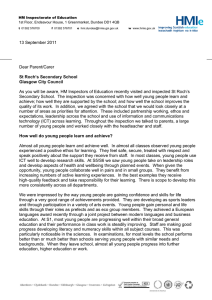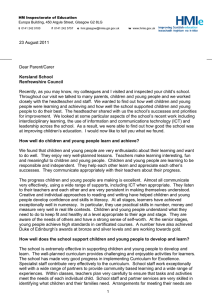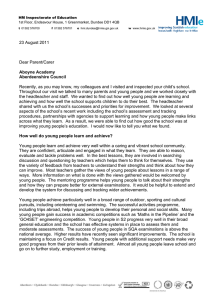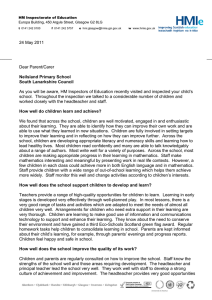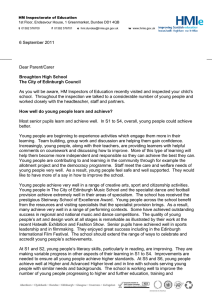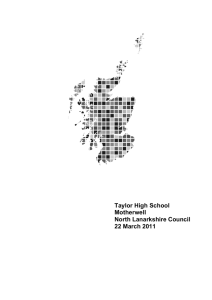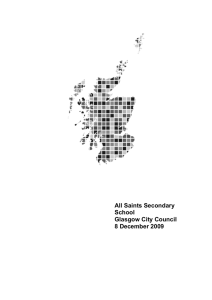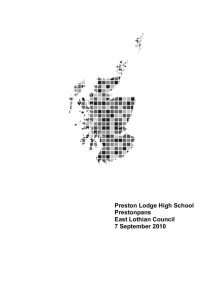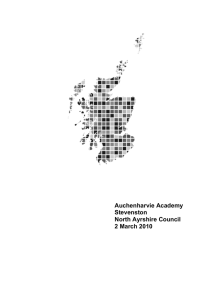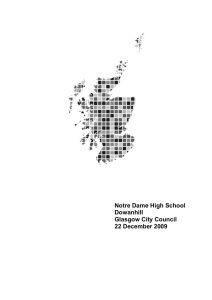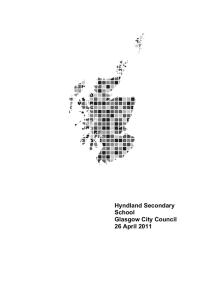31 May 2011 _____ ___
advertisement
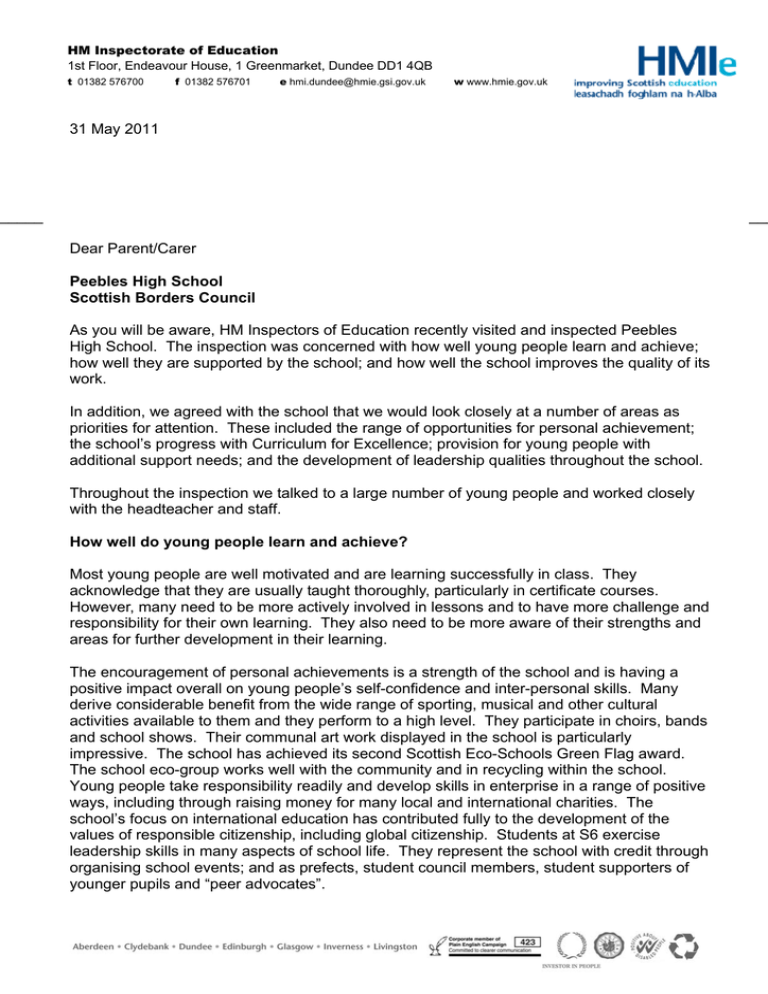
HM Inspectorate of Education 1st Floor, Endeavour House, 1 Greenmarket, Dundee DD1 4QB t 01382 576700 f 01382 576701 e hmi.dundee@hmie.gsi.gov.uk w www.hmie.gov.uk 31 May 2011 _____ ___ Dear Parent/Carer Peebles High School Scottish Borders Council As you will be aware, HM Inspectors of Education recently visited and inspected Peebles High School. The inspection was concerned with how well young people learn and achieve; how well they are supported by the school; and how well the school improves the quality of its work. In addition, we agreed with the school that we would look closely at a number of areas as priorities for attention. These included the range of opportunities for personal achievement; the school’s progress with Curriculum for Excellence; provision for young people with additional support needs; and the development of leadership qualities throughout the school. Throughout the inspection we talked to a large number of young people and worked closely with the headteacher and staff. How well do young people learn and achieve? Most young people are well motivated and are learning successfully in class. They acknowledge that they are usually taught thoroughly, particularly in certificate courses. However, many need to be more actively involved in lessons and to have more challenge and responsibility for their own learning. They also need to be more aware of their strengths and areas for further development in their learning. The encouragement of personal achievements is a strength of the school and is having a positive impact overall on young people’s self-confidence and inter-personal skills. Many derive considerable benefit from the wide range of sporting, musical and other cultural activities available to them and they perform to a high level. They participate in choirs, bands and school shows. Their communal art work displayed in the school is particularly impressive. The school has achieved its second Scottish Eco-Schools Green Flag award. The school eco-group works well with the community and in recycling within the school. Young people take responsibility readily and develop skills in enterprise in a range of positive ways, including through raising money for many local and international charities. The school’s focus on international education has contributed fully to the development of the values of responsible citizenship, including global citizenship. Students at S6 exercise leadership skills in many aspects of school life. They represent the school with credit through organising school events; and as prefects, student council members, student supporters of younger pupils and “peer advocates”. In S4 the school’s performance in examinations is above national averages, particularly at Standard Grade level 5, or the equivalent. At Standard Grade levels 3 and 4, or the equivalent, the school has performed less well than schools serving young people with similar needs and backgrounds, although performance has improved in 2010. At S5 and S6, the school has performed consistently well above these schools, with regard to the proportion of young people gaining Higher and Advanced Higher awards. Almost all young people go on to positive destinations including further and higher education, training or employment when they leave. How well does the school support young people to develop and learn? The curriculum is broad and well balanced overall and carefully planned in many respects. The school makes extensive efforts to offer a wide range of course choices for young people. There is strong emphasis on well-focused and targeted vocational learning, related to young people’s needs, aspirations and employment opportunities. The school also offers a wide range of Higher and Advanced Higher courses. Unsatisfactory facilities have seriously hampered staff in providing high quality physical education. The school is making sustained progress with its plans for the implementation of Curriculum for Excellence at S1 and in the planning of courses at S2/S3. It now needs to ensure that the choices made by young people at the end of S1 build clearly on what they have learned and experienced in primary schools. A clearer curriculum for young people with additional support needs is also required. Staff know young people well. In the majority of classes there are suitable tasks, activities and resources for most learners. However, some lessons lack enough pace and challenge. Those young people experiencing difficulties with their learning also require more consistent support. The school should develop a more coherent and effective approach towards improving the experience of young people with additional support needs, including those with more complex needs. In particular, better teamwork and clearer expectations about staff roles and responsibilities are needed. In some cases more constructive partnership with parents is also a priority. The pastoral support team plays an important role in guiding and supporting learners. In addition, the chaplaincy team, local employers and other professionals, including those in educational psychology and speech and language therapy, provide valuable support for learning within the school. How well does the school improve the quality of its work? Relationships between staff and young people are positive. Most young people feel they are treated fairly and with respect. The senior student council, prefects and those with particular responsibilities make a major contribution to the life of the school. However, many young people do not feel they are as involved as they could be in improving the school and the quality of their learning. The Parent Council, the Parent Teachers’ Association and the PHS 200 Group are highly supportive of the school and its range of activities. Improved communication with parents is an acknowledged priority for the school. Staff morale is variable. Many, including the headteacher and the senior management team, are highly committed to the school and its young people and are prepared to take initiatives and lead developments. However, a significant proportion of staff feel they should be more constructively involved in school improvement, through better communication and clearer priorities. The school serves many of its young people well. The headteacher and members of the senior management team have a clear view of the challenges still facing the school in meeting the full range of learners’ needs. 2. Our inspection of your school found the following key strengths. • Confident, articulate and well-motivated young people. • The wide range of opportunities for personal achievement, offered by many committed staff, which help many young people to develop their talents • High levels of attainment in certificate examinations on the part of many young people. • The wide range of subjects offered in the curriculum which give young people good opportunities for personalisation and choice. • The well-focused opportunities for vocational learning, relevant to the needs and interest of young people. We discussed with staff and the education authority how they might continue to improve the school. This is what we agreed with them. • Develop learning and teaching approaches which increase active learning and the degree of challenge and responsibility offered to learners. • Develop a coherent, consistent and strategic approach towards meeting the needs of those young people experiencing difficulties in their learning, particularly those with complex additional support needs. • Build more consistently on young people’s prior learning experiences in the curriculum especially from primary schools into S1. • Improve communication with parents and other stakeholders. We are confident that with support from the education authority, the school can improve its arrangements and procedures for ensuring continued improvement in the quality of education provided. We will make no further visits at this time. The education authority will inform parents about the school’s progress as part of their arrangements for reporting to parents on the quality of its schools. Our district inspector will maintain contact with the school to support and monitor improvements. Yours sincerely Lachlan MacCallum HM Inspector 31 May 2011 The full record of inspection findings will be shared with the headteacher and staff, the local authority and Chair of the Parent Council. This is part of our ongoing commitment to support continuous improvement through the inspection process. Further information used during the inspection, together with the quality indicator evaluations for Peebles HS, can be found on the HMIE website at http://www.hmie.gov.uk/ViewEstablishment.aspx?id=7502&type=3 3.
